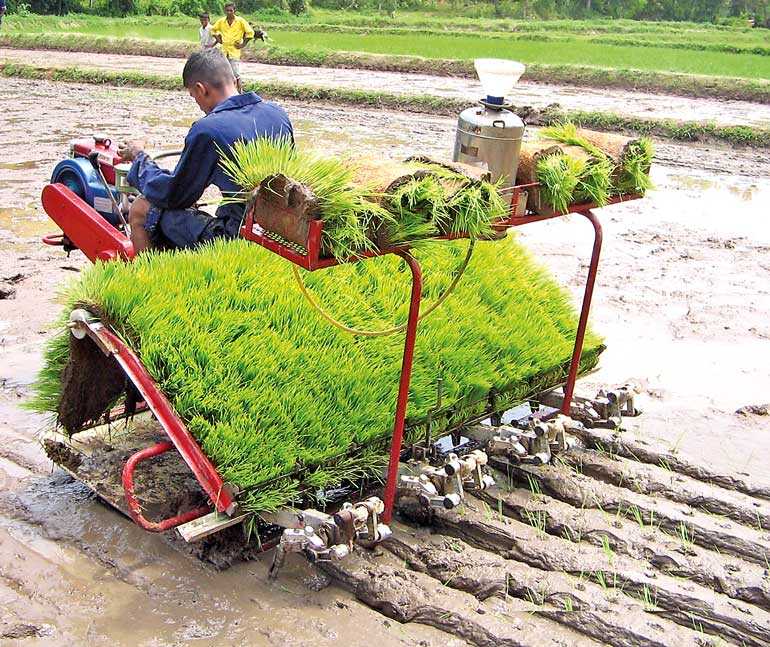Wednesday Feb 18, 2026
Wednesday Feb 18, 2026
Tuesday, 30 March 2021 01:59 - - {{hitsCtrl.values.hits}}

A paddy farmer uses a modern transplanter. The draft National Agriculture Policy aims to double resource productivity (compared to 2020 estimates), with advanced technologies one of the thematic areas.
By Charumini de Silva
The Government has unveiled the draft National Agriculture Policy towards achieving the vision of “sustainable food security to achieve national prosperity,” and is seeking observations and comments from stakeholders and the public.
The policy is primarily focused on food and feed crops, and sustainable food security with improved food quality.
Key issues addressed via the policy are crop production and productivity improvement, true self-sufficiency in basic food needs (food independence), planned resource use, market competitiveness, climate resilience, the minimisation of all risks and uncertainties, and the mainstreaming of gender and youth in the agriculture sector.
According to sources within the Ministry of Agriculture, the necessity of a strong and consistent agriculture policy in directing the agriculture sector to support the economy has been highlighted in President Gotabaya Rajapaksa’s “Vistas of Prosperity and Splendour” national policy framework.
To make this a reality Agriculture Minister Mahindanda Aluthgamage has appointed an expert committee representing the Ministry of Agriculture, Department of Agriculture, and the Department of Agrarian Development, as well as universities, the private sector and the farming community.
The Ministry is seeking stakeholder and public feedback on the draft policy by 25 April.
The draft policy’s mission is to create a “socially-acceptable and sustainable food system in Sri Lanka through a globally competitive agricultural production, processing and marketing mechanism”.
Although the agriculture sector (primary production) accounts for about 7% of Sri Lanka’s Gross Domestic Product (GDP), 21.7% of its total exports, 25.5% of the national labour and nearly one-third of the total land area in the current context, the Ministry said its indisputable contribution to shaping up the socio-economy and the environment of the nation is yet hard to place a value on.
In 2020, the overall agriculture sector accounted for 8.4% of GDP and reported a negative growth rate of 2.4% as against 1% growth in 2019 and 6.5% growth in 2018.
The contraction in agriculture activities in 2020 according to the Department of Census and Statistics was mainly driven by ‘Marine Fishing’ (21.7%), ‘Growing of Oleaginous fruits, including coconut’ (10.2%), ‘Forestry and Logging’ (8.1%), ‘Growing of Tea’ (7.1%) and ‘Animal Production’ (4.9%).
However, during 2020, ‘Growing of Cereals’ (41.3%), ‘Fresh Water Fishing’ (12.7%), ‘Growing of Vegetables’ (10.1%), ‘Growing of Fruits’ (6.2%), ‘Growing of Rice’ (5.7%), ‘Growing of Rubber’ (4.6%) and ‘Growing of Spices’ (3.3%) expanded further.
The new draft agriculture national policy has set multiple goals to be achieved by 2030.
It aims to double resource productivity (compared to 2020 estimates) by adhering to sustainable agriculture practices, as well as the economic profitability of farmers/agri-producers (compared to estimates of 2020).
An increase in the contribution of the agri-food system to one third of the national economy and an increase in the adoption of technology developed locally along the agri-food value chain, by a minimum of 50% from that of 2020, are also stated targets.
Other goals include: supplying safe and quality food in compliance with food control regulations of the country; establishing a government-regulated food control system supporting certification, standardisation, and other logistics; and the establishment of farmer/agri-producer groups with agri-entrepreneurship capacity, coupled with efficient market systems.
The draft policy also aims to establish a constituted role and the mandatory participation of farmers/agri-producers in the process of decision-making in the development of agri-food systems, while also making sure that the impacts of climate change and other disasters are minimised on the agri-food system in Sri Lanka. A system of transparency, accountability, and responsible and participatory governance will also be established with regard to decision making in relation to agri-food systems.
The draft policy has 10 thematic areas and 15 policy statements.
The thematic areas are Crop Production and Productivity, Input Management, Advanced Technologies, Food Safety and Quality Management, Eco-friendly Operations, Agri-Entrepreneurship and Markets, Producer Empowerment, Climate resilience and other risk management, Knowledge Management and Agricultural Extension, and Governance and Operations Management.
Ministry sources said that despite the fact that the “relative” importance of the agriculture sector of a country might be “diminished” over time as the process of structural transformation is put in place, agriculture nevertheless plays an “absolutely” central role and remains a mainstay of the socio-economy of a developing country, in terms of safeguarding food and nutrition security, contributing significantly to employment, economic growth and export earnings, while also ensuring the sustainable use of natural resources.
Sri Lanka’s agriculture sector remains predominantly State-funded and subsistence-oriented, and is characterised by growth without equity. Those challenges are, in fact, multi-criterion, but closely associated, including low agricultural productivity and poor input management, such as land, water and soils, low farm incomes, weak farm-market linkages, and lack of investments on knowledge, technology and information dissemination, etc.
Sri Lanka, as a small island with rich and diversified resources and located in a strategically important geography is also facing new and emerging external threats, including high vulnerability to climate change and changing global market conditions, and a world of opportunities emanating out of the COVID-19 pandemic.
Starting from policy formulation that guaranteed a results-based implementation, and then to evidence-based monitoring and evaluation to eliminate those prevailing and likely threats and weaknesses the sector now faces, formulation of the proposed National Agriculture Policy follows a comprehensive and systematic process that has been coordinated by the Ministry of Agriculture, sources added.